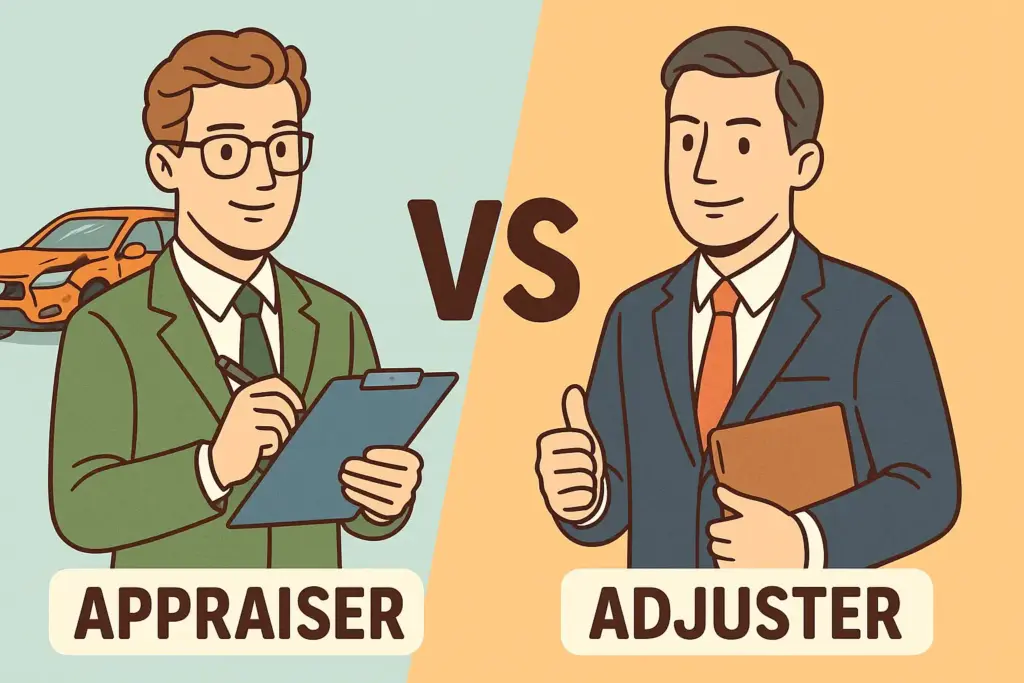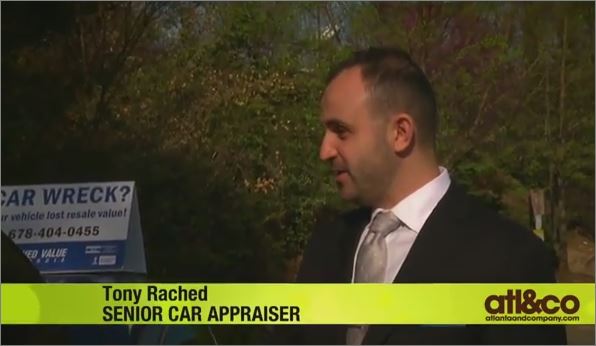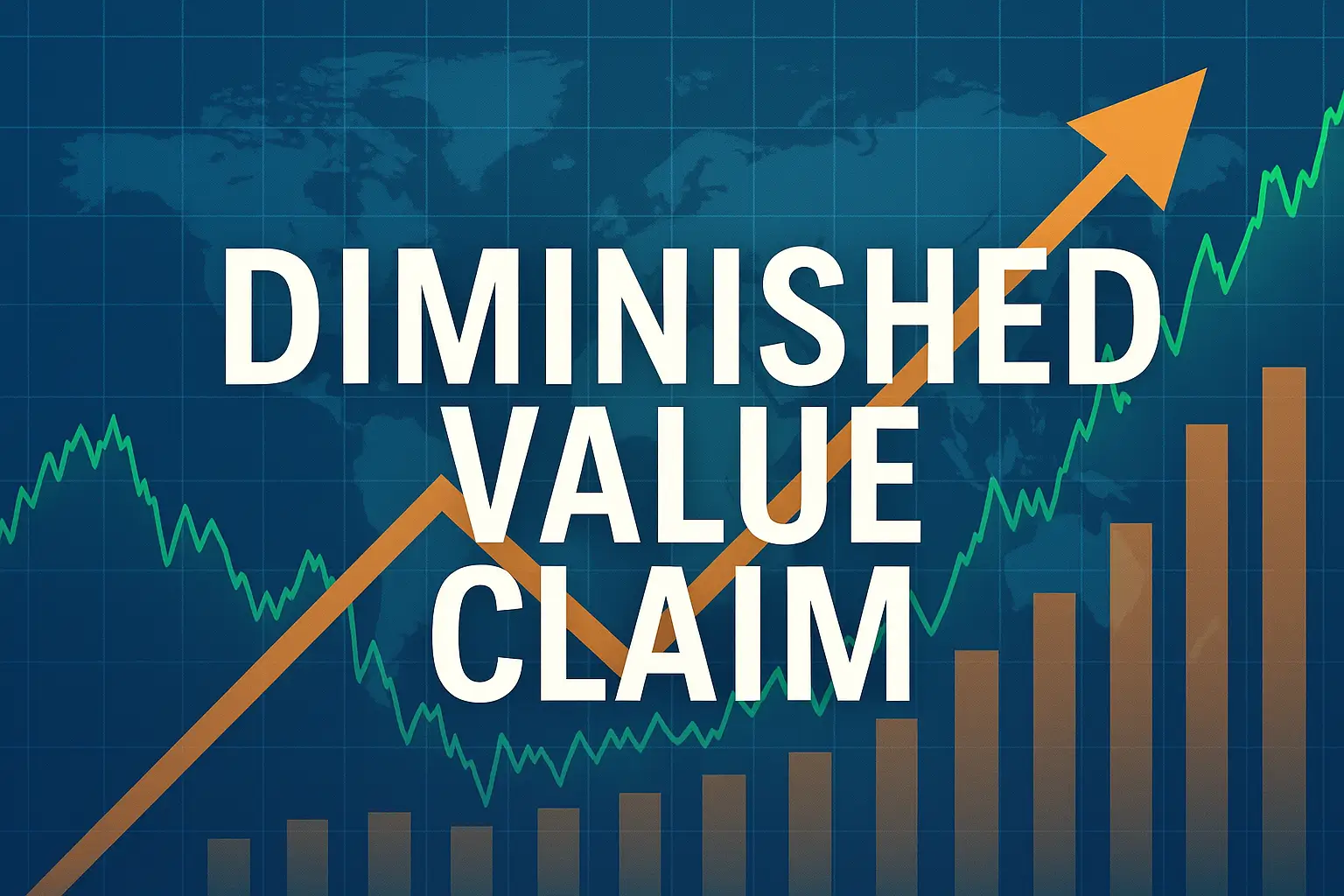When you’re dealing with a car insurance claim, you may come across two important roles: the appraiser and the adjuster.
They both assess damage, inspect vehicles, and estimate costs — but their motivations and responsibilities are far from the same.
Knowing who they are, how they operate, and who they work for can make a major difference in the outcome of your claim.
In this article, you’ll discover the real difference between insurance adjusters and auto appraisers, how each one affects your settlement, and why understanding their roles can help you protect your rights.

Let’s dive into this must-know comparison — and help you take control of your claim.
Quick Comparison – Appraiser vs Adjuster at a Glance
When you’re in the middle of a claim, you don’t always have time to read every detail. So here’s a quick snapshot of how appraisers and adjusters compare — including their roles, motivations, and who they’re really working for.
Role Summary:
- Appraiser: Focuses on evaluating the damage to your vehicle, assigning a fair value based on evidence, and often provides independent, third-party assessments.
- Adjuster: Works on behalf of the insurance company to investigate your claim and determine how much they’re willing to pay.
Main Objective:
- Appraiser: Their job is to assess the value of your loss — often advocating for a fair market estimate.
- Adjuster: Their goal is to adjust the claim in favor of the insurer, often minimizing payout liability.
Who Pays Them?
- Appraiser: Typically hired and paid by the vehicle owner or a third party when a second opinion is needed.
- Adjuster: Always paid by the insurance company — which means their loyalty is usually aligned with corporate interests.
This section gives you a high-level comparison. As we dig deeper, you’ll see how these differences show up in real claim scenarios — and why it matters more than you think.
What are Insurance Adjusters
Insurance adjusters are the first professionals you’ll typically encounter after filing an auto insurance claim.
Their primary job is to investigate the incident, determine what coverage applies under your policy, and propose a settlement amount. While the role sounds straightforward, it’s layered with influence — especially since adjusters are hired and paid by the insurance company.
They start by reviewing the details of your policy and the claim itself. This means diving into the fine print to confirm whether the incident falls under covered damages.
From there, they collect information: interviewing drivers, passengers, and witnesses, and pulling in police reports, photos, or surveillance footage when available.
This early fact-finding shapes how much the insurance company will offer you — if anything at all.
Once the groundwork is laid, adjusters will reach out to discuss your options, including whether you want to move forward with repairs, request an appraisal, or accept a settlement.
It’s at this point that many policyholders face a critical decision — do you trust their offer, or get a second opinion?
The Types of Insurance Adjusters
Not all adjusters are the same. Here’s how they break down:
- Company (Staff) Adjusters: These are full-time employees of your insurance company. They handle the majority of claims and represent the insurer’s interests from start to finish.
- Independent Adjusters: While not direct employees, they’re contractors hired by insurers — often when claim volume is high. They function much like staff adjusters but are brought in temporarily. Their allegiance still lies with the insurance company.
- Public Adjusters: These adjusters are hired by you, the policyholder. They review your claim, represent your interests, and help negotiate with the insurer. However, they charge fees — often a percentage of your final settlement. They’re best suited for complex, high-value claims where you need someone truly in your corner.
While public adjusters can offer support, they also come with trade-offs. Some insurers may refuse to work with your original agent once a public adjuster steps in, so it’s worth weighing the pros and cons carefully.
What are Auto Appraisers?
Auto appraisers play a very different role in the insurance process compared to adjusters. Their focus isn’t on policy details or coverage disputes — it’s on accurately determining the value of your vehicle and the extent of its damage after an accident.
In many cases, appraisers are brought in when there’s a disagreement about how much a repair or total loss is truly worth.
Unlike adjusters, appraisers are typically independent professionals. They don’t work for the insurance company — and that’s a good thing. Their job is to offer an unbiased, fact-based opinion on the cost of repair or replacement, based on the vehicle’s condition, market data, and industry standards.

Appraisers usually coordinate directly with you to set up an inspection. This can happen at your home, your workplace, or even the auto body shop of your choice. The goal is to make the process accessible while ensuring an accurate, detailed assessment of your vehicle.
Types of Auto Appraisers
There isn’t just one kind of appraiser. While their methods are often similar, their roles can vary:
- Independent Appraisers: Most commonly hired by vehicle owners, lawyers, or body shops. They work independently of insurance companies and provide neutral evaluations.
- Insurance Appraisers (in some cases): Some insurers do employ in-house or contracted appraisers, especially for high-value claims. However, their assessments may not be as impartial as those from truly independent sources.
What sets credible appraisers apart is their methodology. They don’t rely on rough estimates or vague assumptions — they apply proven systems and real-world data to ensure accuracy.
How Appraisers Calculate Vehicle Value
To accurately estimate a vehicle’s value after an accident, appraisers take a methodical approach — one that goes far beyond guesswork or vague ranges. They look at a variety of measurable factors, including:
- Year, make, model, and edition of the vehicle
- Current mileage and how it affects market depreciation
- Visible and hidden damage, including structural and mechanical issues
- Repair estimates from trusted auto body professionals
- Pre-accident condition and any prior damage history
At Diminished Value of Georgia, we take this evaluation a step further. Our patent-pending methodology is designed to reflect real-world market conditions — not outdated formulas or insurer-favored shortcuts. Unlike the commonly used and flawed 17c formula, our process considers:
- The actual resale trends in your area
- The severity and visibility of the accident damage
- The quality of repairs and impact on long-term value
- Independent, market-based data to support your claim
This allows us to produce a valuation that is fair, defensible, and fully compliant with both legal and insurer standards — making it far more difficult to dismiss or undervalue. It’s not just about numbers; it’s about giving you leverage, transparency, and peace of mind in a process that often favors the insurance company.
Appraiser vs Adjuster – Core Differences You Should Know
On the surface, both appraisers and adjusters assess damage and assign a value. But the underlying purpose, authority, and bias behind each role couldn’t be more different. Understanding how they compare is crucial if you’re navigating a claim and want to avoid being shortchanged.
Authority in Claims – Who Decides vs. Who Recommends
Adjusters have broad authority. They interpret the terms of your insurance policy, determine whether a loss is covered, investigate the cause of damage, and calculate a settlement offer — all on behalf of the insurer.
Appraisers, on the other hand, have a narrower but more focused role. They do not make decisions about coverage or policy limits. Instead, they are brought in only to determine the value of a loss — nothing more, nothing less. Their authority is limited, but their opinion carries serious weight, especially in disputes.
How Each Affects Your Payout
This is where things get real.
Because adjusters work for the insurance company, there’s an inherent financial incentive to keep payouts low.
That doesn’t mean all adjusters act unfairly — but their job includes protecting the insurer’s bottom line.
The way damages are categorized, the parts approved for repair, or even whether a total loss is declared can all be influenced by internal cost-saving policies.
Appraisers bring balance to the process. By providing an independent valuation, they offer a check on the insurer’s offer.
When the gap between your repair estimate and the insurer’s payout is too wide, an appraiser helps bridge that divide — not through negotiation, but through facts and data.
When You Might Need Both
In a smooth, straightforward claim, you might never meet an appraiser. The adjuster handles the case, and the offer is fair.
But when things don’t go smoothly — if the insurer lowballs your claim, disputes the repair cost, or undervalues your car — that’s when an appraiser becomes essential.
You may even reach a point where you and the insurer each appoint your own appraiser to resolve the disagreement through a formal appraisal process.
If those two appraisers can’t agree? A neutral third party called an umpire is brought in to make the final decision — a process designed to protect both sides and move things forward without the need for a lawsuit.
When Should I Hire an Appraiser?
You don’t have to wait for a problem to contact an appraiser. In fact, reaching out early can make all the difference.
Most professional appraisers offer free claim reviews, meaning they can evaluate whether your offer is fair without costing you a dime.
If everything looks good, great — but if it doesn’t, you’ll know before it’s too late to push back.
Especially in cases involving total loss, diminished value, or confusing claim negotiations, having an appraiser in your corner ensures your payout reflects the real value of your loss — not just what the insurer is comfortable offering.
You have nothing to lose, and potentially thousands to gain.
Not sure if the insurance offer is fair? Get a Free Claim review from our experts!

The Bottom Line
Insurance claims can feel like a one-sided conversation — especially when the adjuster’s offer seems final. But it doesn’t have to be. Appraisers exist to bring balance, transparency, and real-world value back into the equation. While adjusters answer to the insurer, appraisers work to uncover the truth behind the numbers — using facts, data, and expertise to ensure you’re not left settling for less than you deserve.
Whether you’re dealing with a total loss, a diminished value claim, or a repair estimate that feels suspiciously low, an appraiser gives you something priceless: an informed second opinion. And with most offering free claim reviews, there’s no risk in reaching out — only the opportunity to take back control of your claim.
When fairness is on the line, don’t guess. Get clarity. Get an appraiser.



